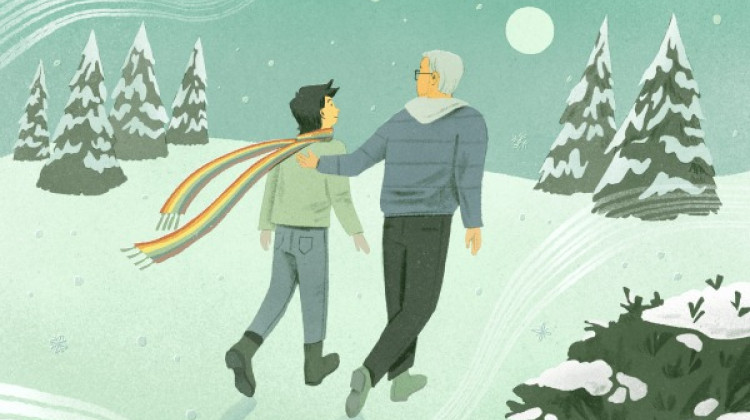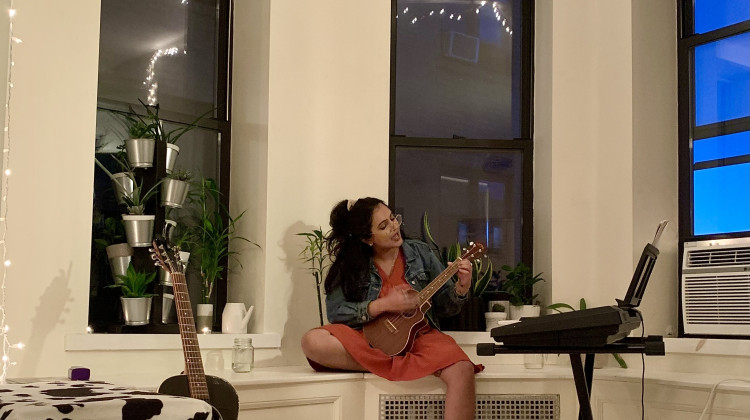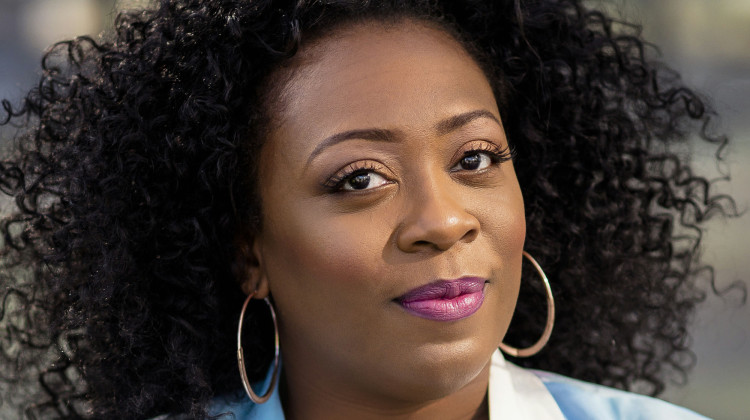Hanukkah continues. That means if you're in the right place, you'll hear a musical tradition that's been around for centuries known as klezmer. To learn more, WFYI’s Ray Steele spoke to Dr. Shawn Royer, the chair of music and theatre at Marian University in Indianapolis.
RAY STEELE: Even though I know what the music sounded like, I personally - as someone who's not of the Jewish faith - I don't recall hearing the term klezmer until about 16 years ago or so. And it was in a children's book of all places about George Gershwin, and how he composed Rhapsody in Blue, and one of the many sounds he incorporated into Rhapsody in Blue was the klezmer music he heard when he was growing up. So, what exactly is klezmer?
DR. SHAWN ROYER: I love that you brought up Rhapsody in Blue because I am a clarinetist. So, Rhapsody in Blue holds a special place in my heart for that, you know big glissando at the beginning of the piece, but I can definitely see the klezmer influence in that piece.
So yeah, klezmer music is basically Jewish folk music, and originates from the Eastern European Jewish traditions and has made its way all across the world, but especially to the United States, where it around the time of Rhapsody in Blue, it kind of mixed with jazz. And so we see a lot of Eastern European influence still, obviously, in klezmer, but also now it has some jazz influence in it as well.
STEELE: I was about to say klezmer was kind of popular music on its own. About a century ago, there were klezmer bands selling records. But you heard that sound a lot, especially during the early jazz big band era. 30s 40s, you really heard a lot of klezmer at least some of that sound and that music.
ROYER: I mean, that makes sense. You know, Benny Goodman, he was called the King of Swing, and he was Jewish. And so, it makes a lot of sense that you would have that klezmer influence all through the big band sound. Artie Shaw as well. It makes a lot of sense.
STEELE: You mentioned the clarinet. It's featured prominently, at least in klezmer that we hear, what other instrumentation are we looking at or does it vary by group?
ROYER: That's the great part. Yes, it does vary by group. There are some traditional klezmer instruments that that we typically associate clarinet obviously, violin or fiddle you know, very prominent typically in klezmer music, accordions.
Now modern klezmer bands can have any instruments in our klezmer and we have an alto saxophone. We have amplified guitar and mandolin, some flutes, some clarinets, electric bass. We have a brass player that alternates between French horn, trombone and sousaphone. We have a drum set player, we have a piano player, and on occasion, we have other auxiliary instruments and of course, trumpets.
The great part is you don't have to be a professional musician to play klezmer. Klezmer is a folk tradition. So, it was handed down, you know, through generations of families and friends and you know, just normal people just hanging out together and picking up instruments and playing them oftentimes self-taught, oftentimes learning by ear. That's kind of the heart of the klezmer tradition.
STEELE: What do you typically play during the Hanukkah season?
ROYER: Well, we play a mixture of like our standard klezmer repertoire that's played all year long. And then there are different songs that we kind of use to celebrate Hanukkah. Hanukkah is a really joyous celebratory holiday songs that most people would recognize, like, “Oh Hanukkah, Oh Hanukkah, go light the menorah.” And like, you know, “dreidel, dreidel, dreidel,” like these are songs that people probably everybody has heard in their childhood, I would think, you know, not just Jewish people. But these are songs and melodies that are familiar, I think, to the wider array of most people in this country, I would think so. We definitely do Rock of Ages, which is a pretty popular song and that is also a klezmer Hanukkah song.
STEELE: It looked like at least from what I've read, klezmer music kind of faded out for a while, maybe middle of last century, at least from the popular arena, certainly surviving within synagogues, the Jewish tradition. But then there was a revival of it. And now you go on YouTube. And you see all kinds of younger groups playing klezmer music and attempting to make a living at it, something of a revival of sorts.
ROYER: Yeah, I would believe that. I mean, in the last century, we saw that happen with lots of different types of popular music. I mean, you know, swing bands used to be the popular music in America where, you know, that kind of faded out around the time of post-World War Two and, you know, people being called to fight in the wars and big bands kind of fading away.
So, we've seen a big influx of vocal music so you know, now we have vocalists singing all the pop music and oftentimes, if it doesn't have a vocalist, it's not very attractive to most people. Klezmer we're lucky we have some klezmer music that has vocals and some that is just all instrumental. But we use klezmer music a lot of times at celebratory events, so people like to dance to it.
It may not be something that they typically sing to, but everybody likes to dance to klezmer music. Oftentimes, we have different holidays where people will dance around the synagogue, to klezmer music and hold hands. And it's always a joyful celebration.
STEELE: Given that this Hanukkah season falls during the ongoing conflict between Israel and Hamas and the shadow of the awful terrorist attack of October 7, how does that affect how you perform and what you perform? If it does at all, during this particular season?
ROYER: It definitely does. This is obviously a very difficult time for the entire Jewish community. Regardless of what part of the world that you happen to live in, everybody knows somebody who is affected by this conflict. And it has been a very, very difficult time for all of us, since the attack, and it's definitely something that we think about on a regular basis.
The klezmer band has played several different services and events since (the attacks), and every time we have a talk about what music we should play. In the past, it's just been like, oh, you know, a fast song and a slow song and just kind of thinking that way. But now we're like, okay, is this an event where maybe we should start by playing the Israeli national anthem, or, you know, is, is this one where we should maybe play a few more slower songs. And, you know, we've just been very conscientious about the mood.
I actually had our amazing Cantor, Cantor Aviva come in and speak to some of my college students at Marian University the other day, and, you know, there's a lot of a lot of information that's been going around on social media, and a lot of different kind of takes on what's been happening.
And so, you know, what was weighing really heavily on her was, how were the college students going to respond to having a Jewish Cantor in the room where, you know, was there going to be tension was there going to be distrust and that kind of thing? So, I think, anytime now, especially with public appearances, that's always weighing on our shoulders.
STEELE: Is it a metaphor, or could it be a metaphor for perhaps the Jewish faith in general, that tragedy after tragedy, over the centuries, the klezmer music always rises, and it always survives and it always is there to bring back the joy? Is that an apt comparison?
ROYER: Yeah, I love that. I'm glad that that you brought that up. I think music in general has always been something that lifts people up in the darkest times. It was something that we saw prisoners from the concentration camps during the Holocaust come out and create some amazing music afterwards.
It's something where klezmer music has a unique way to connect to Jewish people. Something about the sound of klezmer music. It's I mean, I could get into all the music theory but there's a sound that it has that comes from Israel. And that sound permeates all of klezmer music and it's something where I think every single person in the Jewish faith feels it in their heart and, and helps you feel more grounded to your people and part of something bigger. So, I think yes, exactly what you're saying it, it does rise above the darker parts of humanity.
Dr. Shawn Royer is the director of the 65th Street Klezmorim with the Indianapolis Hebrew Congregation. Information is available at https://ihcindy.org. Dr. Royer is also the chair of music and theatre at Marian University.
 DONATE
DONATE









 Support WFYI. We can't do it without you.
Support WFYI. We can't do it without you.